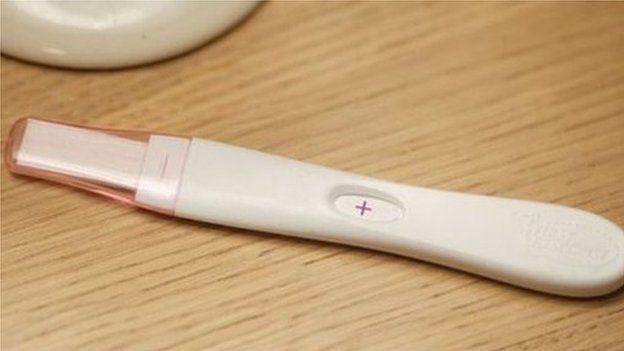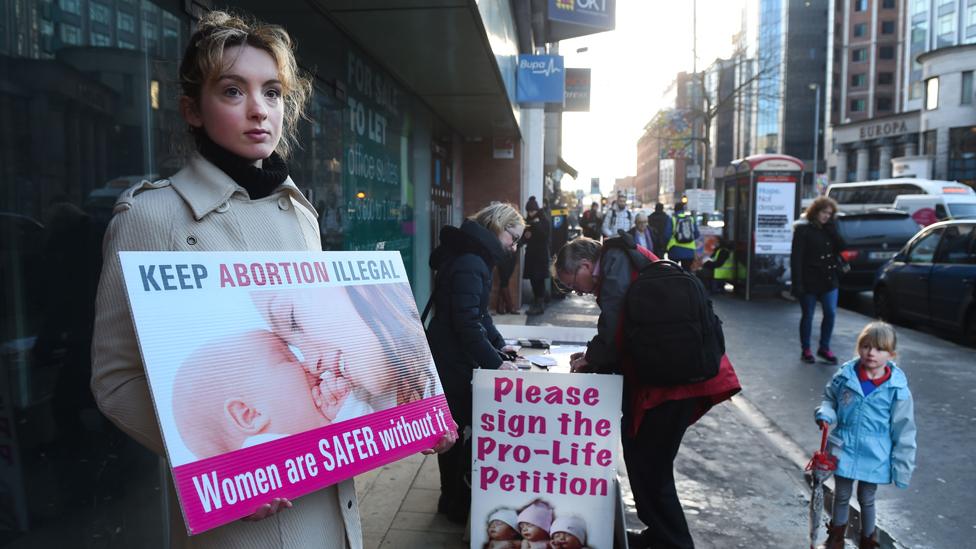Doctor quits over NI attorney general's abortion interventions
- Published
'This was very much a wanted baby,' Dr Gannon told the BBC
A paediatric pathologist has resigned over interventions by NI's attorney general on abortion laws surrounding fatal foetal abnormality.
Dr Caroline Gannon investigated the deaths of babies including those in the womb or stillbirths.
She said the final straw was having to advise a couple to use a picnic cooler bag to return their baby's remains to NI following an abortion in England.
The attorney general said the law was under consideration.
A family can have a post-mortem examination carried out in England - but they are difficult to arrange.
'Untenable position'
Dr Gannon's resignation leaves Northern Ireland with only one paediatric pathologist.
She said the recent interventions by Attorney General John Larkin made her position untenable.
"The workload we had was manageable, but then when these rulings came out - that was the tipping point and for me, professionally," she told BBC News NI.
"I just felt I was acting unethically by taking part in this system where parents are denied a voice in what happens to their baby."

AG's interventions in NI abortion law:
November 2012: The AG offered to assist Stormont's Justice Committee in an investigation into Belfast Abortion Clinic. This was later rejected.
November 2015: The AG appeals a High Court judgement which ruled that NI's almost outright ban on abortion breaches human rights law. The ruling states that sexual crime and cases of fatal foetal abnormality should be grounds where terminations can be performed legally.
February 2016: The AG wrote to TUV MLA Jim Allister questioning whether a move to allow abortion in cases of fatal foetal abnormalities was compatible with international human rights law. The proposal was one of a number of amendments to the Justice Bill, ahead of a vote on the issue by MLAs.

Northern Ireland's Attorney General John Larkin says the law on cases of fatal foetal abnormality is currently under consideration by the Court of Appeal

Dr Gannon cited the example of one couple who wanted a post-mortem examination to find out why they had been told their baby had a fatal foetal abnormality.
As it remains illegal in Northern Ireland for an abortion to be carried out on the grounds of such a diagnosis, the couple had to travel to England for the termination.
The only way they could find to transport the remains home was in a cooler bag with ice packs.
"They're on their own in a strange town, a strange country in a private clinic with no support," said Dr Gannon, who has worked in Northern Ireland for almost 30 years.
'Change the legislation'
Grieving father calls for change in abortion legislation
Had the couple been in Northern Ireland, there would have been midwives present and hospital processes in place so they could sit with their baby, she added.
"Somebody else would be responsible for bringing their baby down to the mortuary to ensure the post mortem is carried out," she said.
"But they had to organise that themselves and transport their own baby's body back in a picnic cooler, in the boot of the car, on the overnight ferry."
The father of the woman involved said he travelled to England the day after his daughter with the cooler bag.
Describing the whole experience as traumatic for his family, he told the BBC's Talkback programme that he hoped the attorney general would never have to know what it felt like.
"It was horrendous and it's a terrible, terrible shame that Northern Ireland, in this day and age, has to look people straight in the eye around the world and say this is the way we deal with these things," he said.
"I just please hope that this will change the legislation because at least something good would have come out of the the most awful experience."

Attorney General statement
The law on abortion in cases of so-called fatal foetal abnormality is currently under consideration by Court of Appeal
The court is considering, among other things, an argument by the Attorney General that allowing terminations in such cases discriminates against children with disabilities - based on the UN Convention on the Rights of Persons with Disabilities
While there's no legal barrier to a post-mortem examination on remains of babies who are aborted in England and Wales, an NI coroner has no jurisdiction to conduct an inquest where death occurs outside NI. An NI coroner can't order a post-mortem investigation into a death outside NI
Post-mortem examinations can play an important role in developing medical knowledge and understanding limitations on such knowledge. The UK Parliamentary Inquiry into Abortion on the grounds of Disability says "of 32 post mortem examinations that he knew had been done on late stage terminations, there have been two where the diagnosis had been profoundly wrong"

Mr Larkin previously argued that allowing terminations in cases of fatal foetal abnormality discriminated against children with disabilities.
He has also said there is no agreed clinical definition of fatal foetal abnormality.

Current abortion legislation in Northern Ireland differs from the rest of the UK
The BBC understands several couples have used various modes of transport, including a parcel courier company, to transport the remains of their babies home.
Dr Gannon said she felt it was unethical to work in a system where women and couples were being "denied information and choice".
"I cannot reconcile the legal system I am having to operate under with my own personal ethical beliefs," she said.
- Published14 September 2016

- Published11 February 2016

- Published27 July 2016

- Published8 April 2016

- Published10 February 2016
